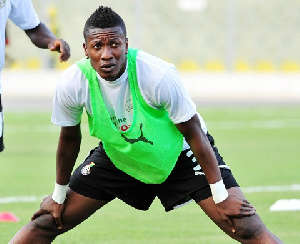As we enter June 2020, we’re approaching the 10-year anniversary of Ghana’s run to the quarter-final at the 2010 World Cup in South Africa.
This also means that we’re 10 years removed from Asamoah Gyan’s finest hour, as the Black Stars frontman netted late winners against Serbia and the United States to inspire the West Africans to the Last Eight.
It was the striker, of course, who won many admirers for stepping up to slam home the first Ghanaian penalty in the shootout after having missed the last-minute spotkick following Luis Suarez’s goalline handball from Dominic Adiyiah’s close-range attempt.
It was a glorious defeat for the Black Stars, and Gyan was the world’s poster boy for this exciting team who had gone closer than any other African team to the semi-finals, and arguably missed out due to a grave injustice.
Gyan had the world at his feet, and few would have anticipated that, over the next 10 years, that would have been as good as it ever got for the striker.
Today, at 34, Gyan is without a club, having left NorthEast United earlier this year, as the Indian side turned to former Wolverhampton Wanderers and Republic of Ireland forward Andy Keogh to lead the line.
As Gyan approaches the end of his career, he could be excused for looking back over the last decade and questioning whether his decisions truly maximised his talent and potential.
While he moved to Sunderland in 2010, on the back of his performances at the World Cup, joining the Wearsiders for a then club-record £13 million fee, he lasted a little over a year in the Premier League.
Even though his stay in England was brief, there was enough evidence to suggest that Gyan was primed for greater things than Sunderland, not least, goals against Chelsea, Tottenham Hotspur, and in the derby against Newcastle United.
Despite making a good impression—with his athletic, aggressive forward play and strong goal sense—he departed for Al Ain in September 2011, later acknowledging that he didn’t move for sporting reasons.
“I enjoyed every single minute there. It’s one of my proudest moments in life to have played at such a great club in such a unique football country. Sometimes I feel that I left early but maybe that’s what fate had in store for me,” he told FourFourTwo.
“Look, I’m going to be honest here, it was the money. It was too good to turn down but a hidden detail is that Sunderland accepted a £7m loan offer for me from Al Ain before even informing me.”
The move doubtless allowed Gyan to earn even more money than the salary he was on at Sunderland, or the cash he could have received at a major European giant, but it took him out of the central narratives of the European game, and doubtless affected his legacy.
From 2011, while Didier Drogba, Michael Essien, John Obi Mikel, Yaya Toure, Mohamed Salah, and Sadio Mane have been winning the biggest and most visible prizes in the European game, Gyan has been playing against the defences of the United Arab Emirates and China.
There’s no doubt he was successful in Asian football, where he was a top scorer in the UAE Pro-League, won the title, and clinched the AFC Champions League.
However, didn’t Gyan’s talent demand better?
Could he not have tested himself on a grander stage, and managed to couple a—potentially—slightly weaker financial return for the chance to compete for the biggest honours in the game?
Ultimately, Gyan has the right to seek exactly what he wants for his career, but there’s little doubt that—when comparing and contrasting the African greats of this century—his standing is dented by his choices.
When we evaluate Gyan among the pantheon of African greats, his club career certainly lets him down, with his prizes won with Al Ain FC scant reward for his talent, potential, and early progress.
His international career is what is left to commend him, and indeed, Gyan did enjoy some sensational moments in the white of the Black Stars.
Those goals—and the miss—at the 2010 World Cup obviously were the stand-out moments, and it’s to his immense credit both that he helped Ghana qualify for the tournament on three occasions—including their first edition in 2006.
Similarly, as Africa’s all-time top scorer at the World Cup—eclipsing Roger Milla—his ability to star on the grandest stage of all is not in doubt.
He’s Ghana’s all-time top scorer—an immense return considering the Stars’ litany of excellent attackers over the years—although again, taken in its entirety, his international career can be considered a disappointment as well.
Despite amassing well over a century of Ghana caps—and representing the Stars at eight Afcon tournaments—he failed to win the continent’s top prize.
During Gyan’s international career, he’s watched the likes of Yaya, Salomon Kalou, John Obi Mikel, Mohamed Aboutrika, and Riyad Mahrez all get their hands on the Nations Cup.
Yet Gyan, despite being backed up by perhaps the strongest generation in Ghana’s history, wasn’t able to get over the line.
There were the near misses, of course, and injury and illness affected him in 2015 and 2017 when Ghana appeared to have the momentum to get their hands on the gold.
However, even though his international career overshadows his club career in terms of Gyan’s legacy, that too leaves a lot to be desired.
As we approach the 10-year anniversary of Ghana’s run to the World Cup quarter-final, it’s proved to be a false dawn for its key protagonist Gyan.
He received Ballon d’Or votes that year, he finished second—behind Eto’o—in the African Footballer of the Year voting, but does he truly deserve to be considered among African football’s modern greats?
Source: goal.com
 Home Of Ghana News Ghana News, Entertainment And More
Home Of Ghana News Ghana News, Entertainment And More





